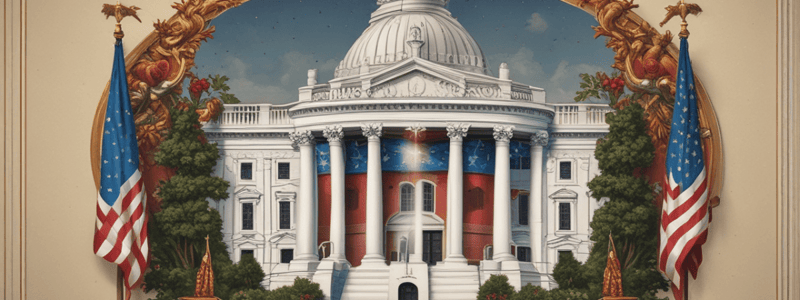Podcast
Questions and Answers
What is the primary reason why state powers are generally more limited than national ones?
What is the primary reason why state powers are generally more limited than national ones?
- State governments have less enforcement capability than the federal government.
- The U.S. Constitution grants more authority to the federal government.
- The decentralized nature of American government restricts state powers. (correct)
- State governments have smaller budgets compared to the federal government.
Which of the following is an example of a shared power between the federal and state governments?
Which of the following is an example of a shared power between the federal and state governments?
- Regulating the sale of firearms.
- Setting the national minimum wage.
- Establishing immigration policies.
- Regulating workers' compensation. (correct)
What is the primary reason why balance and cooperation between the federal and state governments are essential in cases of shared powers?
What is the primary reason why balance and cooperation between the federal and state governments are essential in cases of shared powers?
- To allow state governments to override federal policies in their jurisdictions.
- To ensure that the federal government maintains ultimate authority.
- To prevent the federal government from encroaching on state sovereignty.
- To prevent conflicts and ensure efficient implementation of policies. (correct)
What is the main purpose of understanding the division and interaction of national, state, and shared powers?
What is the main purpose of understanding the division and interaction of national, state, and shared powers?
According to the passage, which of the following is NOT a reason why state powers are generally more limited than national ones?
According to the passage, which of the following is NOT a reason why state powers are generally more limited than national ones?
Study Notes
Government Powers
The concept of government powers refers to the authority granted to various levels of governments by their respective constitutions and laws. In the United States, these powers can be broadly categorized into three types: national powers, state powers, and shared powers. Each type of power is distinct, with its own unique characteristics and limitations.
National Powers
National powers refer to the responsibilities and authorities held by the federal government within the scope of its constitutionally delegated duties. These powers were designed to address issues that could only be effectively addressed by a centralized government entity, such as foreign affairs, defense, interstate commerce, and certain aspects of taxation. National powers have been interpreted and expanded over time through legislative acts, judicial decisions, and executive actions, resulting in an all-encompassing definition that includes everything from international relations to public health measures.
State Powers
State powers refer to the authorities and responsibilities held by individual states under their respective state constitutions. State governments primarily focus on local matters that are better managed by smaller entities, such as education, law enforcement, social services, and environmental protection. Although state powers are generally more limited than national ones due to the decentralized nature of American government, they still play a crucial role in ensuring effective governance across diverse regions and communities.
Shared Powers
Shared powers exist when both the federal and state governments have overlapping jurisdiction over specific issues. This occurs because the U.S. Constitution grants each level of government some degree of authority over the subject matter, leading to a dynamic relationship between the two entities. Examples of shared powers include regulation of alcoholic beverages, workers' compensation, and unemployment insurance. In cases of shared powers, balance and cooperation between the federal and state governments are essential to prevent conflicts and ensure efficient implementation of policies.
In conclusion, understanding the division and interaction of national, state, and shared powers is essential for comprehending the structure and function of the United States government. By recognizing each level's specific roles and responsibilities, individuals can appreciate how this complex system allows for cooperative yet independent management of our society's most critical issues.
Studying That Suits You
Use AI to generate personalized quizzes and flashcards to suit your learning preferences.
Description
Explore the concept of government powers in the United States, including national powers, state powers, and shared powers. Learn about the distinct responsibilities and authorities of each level of government and how they interact to govern the country effectively.




